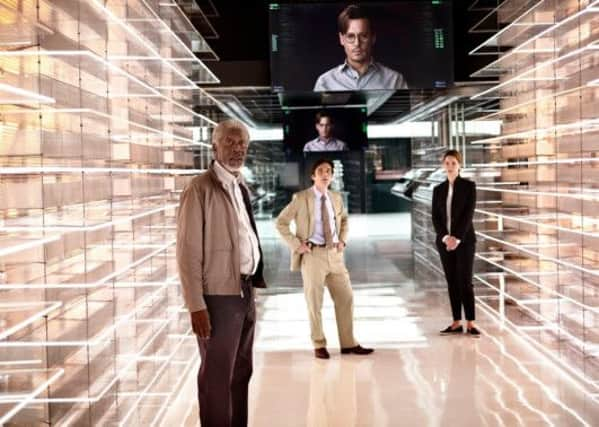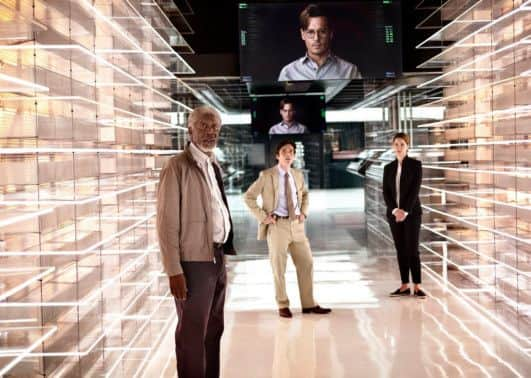Film review: Transcendence (12A)


Transcendence (12A)
Directed by: Wally Pfister
Starring: Johnny Depp, Rebecca Hall, Paul Bettany, Morgan Freeman, Cillian Murphy


Star rating: * *
Early on in Transcendence, Johnny Depp’s character Will Caster is shot with a polonium-laced bullet that grazes his body but gives him a fatal dose of radiation poisoning. Will is a world-renowned researcher into Artificial Intelligence (AI), as well as being a somewhat idealistic believer that sentient AI supercomputers will soon be able to solve all the world’s problems – like cancer and pollution. His would-be assassin, meanwhile, is a member of RIFT (the acronym stands for Revolutionary Independence From Technology), a “neo-Luddite” terrorist group. RIFT has initiated a widespread plan to save humanity by killing the architects of this next-level, mainframe-powered future – an act of extremism that Will (now facing imminent death) suggests is “not big on logic but certainly has no shortage of irony”.
Advertisement
Hide AdSadly, as Will’s brain is uploaded to a supercomputer in his final days and his digitised self begins taking over the world by virtual means, the same criticism could be applied to the film. The directorial debut of Christopher Nolan’s go-to cinematographer Wally Pfister, Transcendence is a big, solemn, but ultimately rather silly sci-fi parable that uses the full arsenal of computer technology at its disposal to deliver an overly familiar cinematic jeremiad about the danger of having too much computer technology at our disposal. Its B-movie plotting isn’t especially big on logic, nor is Pfister’s attempt to spread his wings as a filmmaker short on irony, especially given that he’s essentially delivered a kind of celluloid simulacrum of a Christopher Nolan movie, right down to roping in his former collaborator as an executive producer and pilfering high-profile performers from Nolan’s stock company of actors for his supporting cast.
Chief among that supporting cast is Rebecca Hall as Will’s beloved wife Evelyn, whose desire to use her husband’s work to change the world will cast us out of the digital garden of Eden the internet was supposed to usher in. That, at least, is how the film starts. Kicking off in a ruined future that’s devoid of power, littered with defunct mobiles and full of people repurposing laptops as doorstops, Transcendence wastes no time in layering on the biblical references as it subsequently rewinds to a pre-fall near-future. From Evelyn’s name, to the idyllic garden Will creates for her in their home, to all the discussions about omnipotence and God that emerge from an early, concept-explicating TED Talk Will gives prior to the assassination, the biblical overtones come so thick and fast that it’s a wonder Apple’s bite-marked logo doesn’t pop up as a nifty bit of product placement.
Alas, the biblical borrowings are a sign of the po-faced hokum to come as the moribund Will is first uploaded into the artificially intelligent computer he’s been developing, and then taken online by Evelyn against the advice of their best friend Max (Paul Bettany). Max is a believer that technology should serve humanity not the other way around and is thus on hand to serve as a sort of moral conscience of the tech world.
Sadly, any such debates get dumbed down and confused as Will achieves his new titular metaphysical state (a riff on a real concept known as “the Singularity” that Will namechecks in the film). With evil, blonde-haired RIFT members (led by Kate Mara) closing in, digital Will’s first act is to use his brain’s new exponential capacity to gather and use information to manipulate Wall Street and turn Evelyn into an overnight multi-millionaire. His next act is to hack into the FBI mainframe and help Cillian Murphy’s Agent Buchanan pinpoint RIFT’s anti-technology revolutionaries, allowing Will and Evelyn to start buying up real estate in the desert and creating a massive solar-powered computer lab so he can start sating his thirst for power and his appetite for upgrading the world to a more efficient version of itself. All of this apparently happens in a two-year period in which the FBI seem to have no interest in Will 2.0, his now-billionaire wife, or their sprawling tech compound in the desert – although when we rejoin them (after a logic-gap-covering inter-title), interest certainly does wane, especially as Will’s messianic proclivities result in lots of nanotechnology enhanced miracles being performed, requiring Pfister to deploy exponentially greater levels of CGI.
What’s lacking here is a relatable emotional through-line. Will is too thinly conceived in his pre-digitised form to maintain much interest in the central question of how much of him has survived in the computer and Depp’s virtual presence doesn’t help – this might be the first example of a movie star Skyping it in. It’s also tough to root for Evelyn, given what she unleashes, and the rest of the characters are too schematically conceived to offer enough of a human element to care about the implications of the big ideas Transcendence is superficially interested in exploring.
What a disappointment.